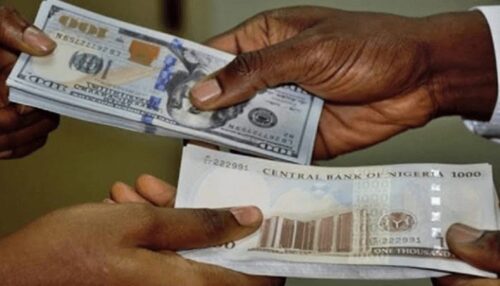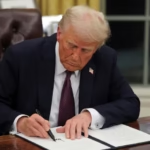
The gap between Nigeria’s official and parallel foreign exchange (FX) markets is reducing, driven by a series of policy measures implemented by the Central Bank of Nigeria (CBN).
On Wednesday, the naira appreciated to N1,585 per dollar in the parallel market, surpassing the psychological threshold of N1,600. Meanwhile, in the official FX market, the naira remained relatively stable, closing at N1,499.76/$, compared to N1,498.95/$ recorded on Tuesday, according to data from the FMDQ Securities Exchange Limited.
This development marks a significant shift, as the spread between the official and black market rates has reduced by N85.24/$. Compared to the beginning of the year, the naira has gained five percent, appreciating from N1,665/$ in the parallel market.
Currency traders attribute the recent gains to improved dollar liquidity and reduced demand for foreign exchange, largely influenced by CBN’s monetary policies.
CBN Governor Olayemi Cardoso, in his Monetary Policy Committee (MPC) personal statement, emphasized that the bank’s tightening measures have been instrumental in stabilizing the FX market and reducing exchange rate disparities.
Similarly, Aloysius Uche Ordu, an MPC member, noted that the exchange rate remained stable for most of the second half of 2024 due to increased capital inflows, fueled by attractive yields in Nigeria’s financial markets.
Despite a recent dip in external reserves to $39.55 billion as of February 4, 2025, another MPC member, Bala Moh’d Bello, pointed out that reserves had previously surged to $40.88 billion in November 2024, strengthening Nigeria’s financial barriers against external shocks.
Furthermore, Bandele A.G. Amoo, also an MPC member, highlighted that total FX inflows reached $6.175 billion in September 2024, a significant rise from $2.57 billion in August 2024. Nigeria’s foreign reserves stood at $39.68 billion at the end of October 2024, providing several months of import cover. He projected further increases in reserves, driven by reduced import demand following the deregulation of the downstream oil sector and increased FX inflows.
As part of its FX market reforms, the CBN has mandated that authorized dealers sell a maximum of $25,000 per week to each Bureau de Change (BDC) operator. Additionally, BDCs must comply with strict pricing regulations, ensuring that foreign exchange sales to end-users do not exceed a 1% margin above the buying rate. BDCs are also required to submit daily reports on FX purchases and sales through the Financial Institutions Forex Reporting System (FIFX).
Funds obtained by BDCs are restricted to specific transactions, including Business Travel Allowance (BTA), Personal Travel Allowance (PTA), Overseas tuition fees and Medical expenses abroad.
The maximum disbursement per transaction is capped at $5,000 per quarter, and all transactions must be documented with the end-user’s Bank Verification Number (BVN) and endorsed in their international passport.
The CBN emphasized strict adherence to Anti-Money Laundering (AML) regulations and Know Your Customer (KYC) compliance. Any BDC or authorized dealer found violating these guidelines or diverting funds will face sanctions, including license suspension.
The CBN’s recent policies emphasize its commitment to stabilizing the naira and creating a more transparent and efficient foreign exchange system. As FX supply improves and regulatory measures take hold, Nigeria’s position as an attractive investment destination could strengthen further in the coming months.


